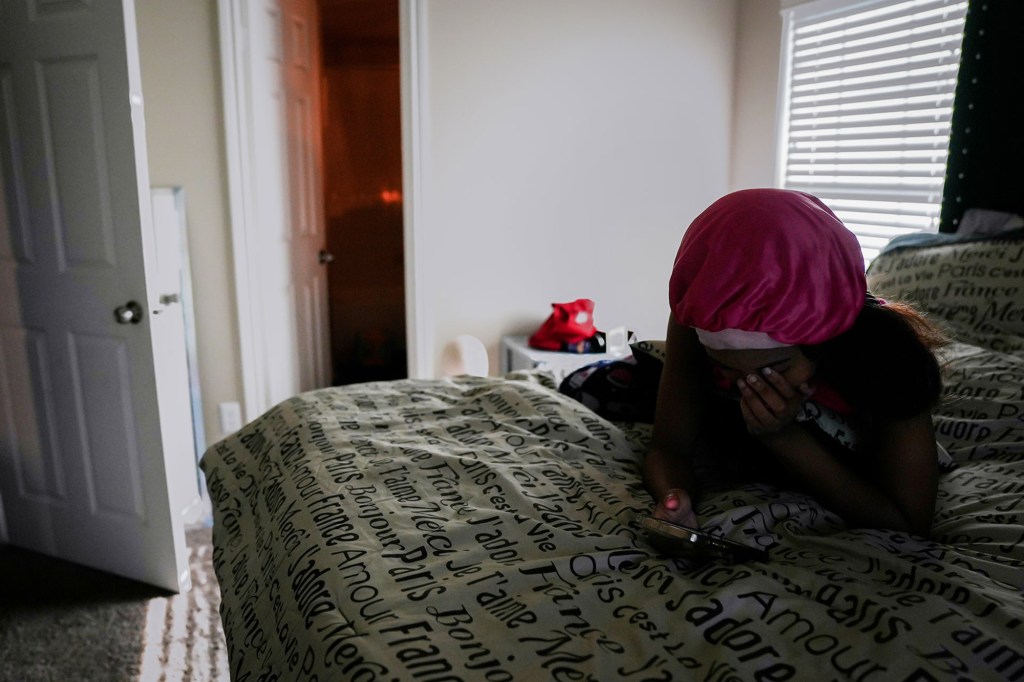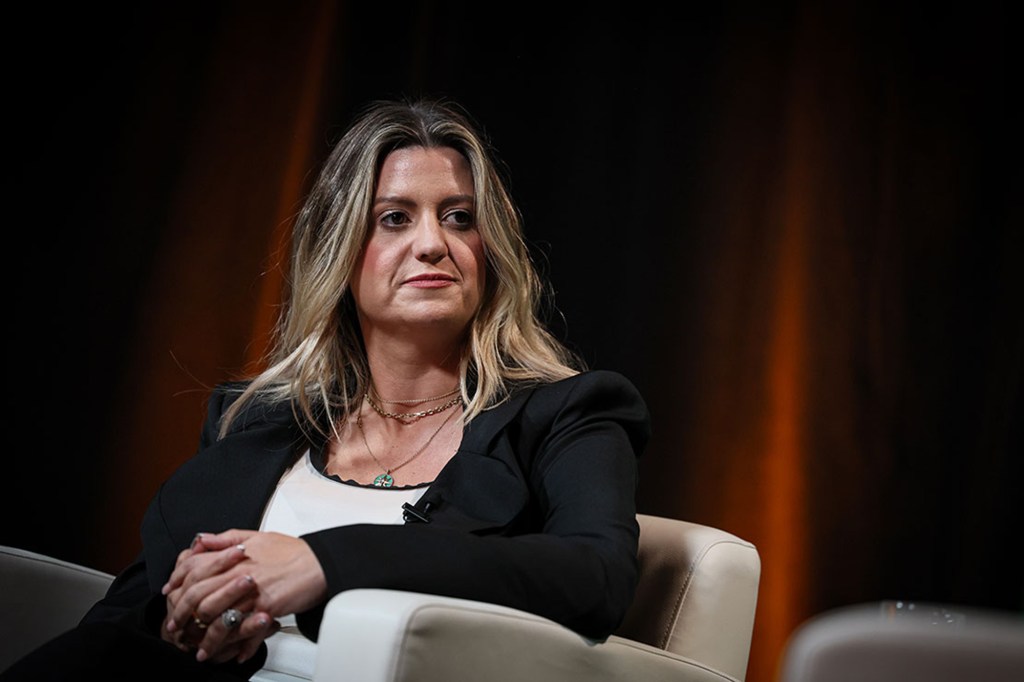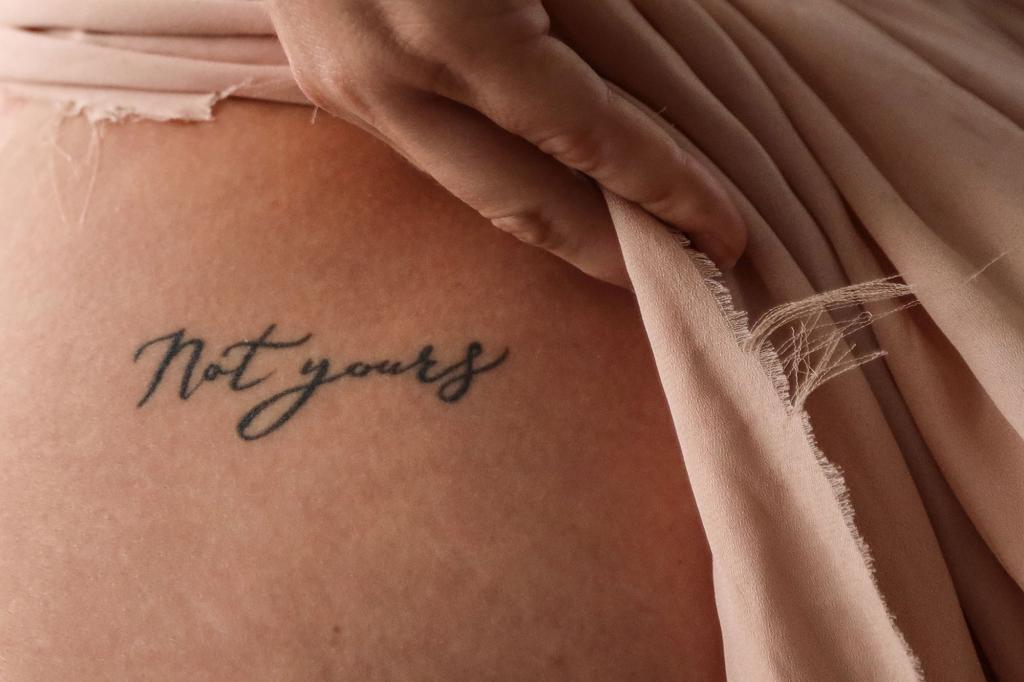Behind the OnlyFans porn boom — inside allegations of rape, abuse and betrayal
Sammy remembers nearly every detail of the night in April 2022 when she says two men raped her.
The Miami apartment, stark and empty, where it happened.
The loud music as she screamed and told them to stop.
The fear and the pain, the overwhelming sense of powerlessness.
Sammy, recalling the night in an interview, also remembers seeing a phone perched on a dresser and thinking: Am I being filmed?
Two months later, on June 30, an edited recording of Sammy’s alleged assault was posted on OnlyFans, a website where people can create porn and charge for it.
The video was marketed by one of her alleged assailants as “train” sex, jargon for multiple men having sex with one woman, according to screenshots obtained by Reuters.
“The full train video is here guys,” he said on OnlyFans.
“Who wants it?”
OnlyFans is an adults-only website where anyone – celebrities, porn stars, cash-strapped moms and aspiring influencers – can sell sexually explicit videos of themselves.
Top earners make millions of dollars a year.
Created in 2016, OnlyFans now boasts almost 240 million users and has achieved mainstream fame.
Beyoncé namechecked it in a song lyric.
Rapper Iggy Azalea said it had brought her a small fortune.
But other people have reaped pain, not profit.
They describe lives upended after sexually explicit content featuring them was posted and sold on OnlyFans without their consent.
Some videos, like Sammy’s, involve alleged sexual assault.
Law enforcement has struggled to monitor such nonconsensual pornography on the website, while victims often have limited legal recourse.
OnlyFans says it is building “the safest social media platform in the world.”
But a Reuters investigation identified 128 cases in which women and men complained to U.S. law enforcement agencies that sexual content featuring them ended up on OnlyFans without their permission – and was often sold for profit – between January 2019 and November 2023.
Under public records laws, Reuters sought documents on cases involving OnlyFans from more than 250 of the largest law enforcement agencies in the United States – the platform’s biggest market.
Fifty-six of them produced records in which people complained of explicit, nonconsensual posts on OnlyFans.
Reuters also interviewed police officers, prosecutors, legal experts and nine people who said their sexual images appeared without their consent.
Most of the 128 police complaints were lodged by women against men who were former sex partners.
They often said the content was produced consensually but was posted without their permission – or even their knowledge.
In about 40% of the complaints, the videos also appeared on other popular social media sites, usually as snippets to promote lengthier and more explicit material for sale on OnlyFans.
The cases highlight how technology has transformed modern relationships and the porn industry.
Today, anyone with a cellphone and an internet connection can make and distribute sexual videos and images. Filming and sharing these is now an accepted part of many intimate encounters – so long as it’s a lovers’ secret. Posting those videos online, however, can feel like a major betrayal.
It can also be illegal.
Some women said their unwanted appearance on OnlyFans had nearly destroyed their lives.
“A whole company has made money off of my biggest trauma,” said Sammy, 21, in her first public comments on the case. She requested that her full name be withheld.
In Texas, a woman described being forced to install a home security system after being harassed by stalkers who saw an OnlyFans video of her that went viral.
A Nebraska woman said she struggled to go out in public, terrified that people might recognize her from a sex video her ex-boyfriend was selling on OnlyFans for $15.
An Illinois woman said she learned that naked images of herself were circulating from her teenage daughter, who saw them online.
In response to a detailed account of Reuters’ findings, an OnlyFans spokesperson said that “in the few examples where bad actors have misused our platform,” OnlyFans “removed the content swiftly, banned the user and actively supported investigations and prosecutions.”
The spokesperson said OnlyFans had reviewed the cases of Sammy and others described in this report and found that those accounts were deleted either by OnlyFans moderators or the creators themselves.
Those deletions sometimes occurred a year or longer after women complained to police, a Reuters review of police records and account information from OnlyFans found.
The spokesperson didn’t elaborate on the cases but said OnlyFans tightened its consent verification procedures in late 2022.
The company requires “proof of identification and consent from all individuals featured in any explicit content uploaded to our platform, and we moderate all uploaded content,” she said.
She declined to respond to questions about how explicit content of non-consenting adults could have ended up on the site when OnlyFans says it moderates everything.
Combining social media glamor and the business of sex, OnlyFans casts itself as a new breed of adult website.
Most big porn sites offer content for free and make money mainly from advertising.
At OnlyFans, revenue is generated by its 3.2 million creators, most of them amateurs.
They sell content to their subscribers, or “fans,” usually for a monthly fee of between $4.99 and $50.
One-off sales of videos and images through the site’s direct-messaging function can be even more lucrative.
The terms are attractive for OnlyFans creators: They keep 80% of their fans’ payments.
For OnlyFans, which takes the rest, it’s a goldmine.
According to the most recent filing by its British parent company, Fenix International, OnlyFans’ pre-tax profit in 2022 reached $525 million – almost a hundred-fold increase in just three years. Revenue expanded at least twenty-fold to more than $1 billion.
OnlyFans doesn’t know how many of its creators are making “adult content,” the spokesperson has said. The platform says it also features sports, music and other non-explicit material.
Beyond the United States, OnlyFans has also seen explosive growth – along with allegations of abuse against celebrities and other content creators.
In Australia, a Queensland man faces trial after being accused of filming himself raping his unconscious girlfriend in 2021 and uploading the video to OnlyFans, according to court records.
The man hasn’t entered a plea, a court official said.
In Thailand, a married couple was arrested in October on suspicion of drugging and raping four women and a 17-year-old girl, then selling videos of the acts on OnlyFans, Thai police said.
The couple hasn’t entered a plea but denied the rape charges, police said.
In Romania, former kickboxer Andrew Tate is awaiting trial on rape and sex-trafficking charges connected to running an operation that allegedly forced women to create porn for OnlyFans, said Romanian prosecutors.
Tate denies the charges.
In Britain, Stephen Bear, a former reality show contestant, was sentenced in March 2022 to 21 months in jail after posting a sex video of his ex-girlfriend on OnlyFans without her permission.
Bear, who denied all charges, was released in January after serving half his sentence.
He didn’t respond to a request for comment.
Reuters documented another 17 cases in Britain in which people had complained to UK authorities of nonconsensual porn appearing on OnlyFans, according to public records obtained from the country’s police forces.
Despite the attention generated by high-profile cases, law enforcement officials say the sheer size of OnlyFans and the paywalls surrounding its individual creators have made it nearly impossible to monitor systematically.
OnlyFans is largely a black box to outsiders, much less accessible than social media sites like Instagram, X and Facebook.
The paywall “absolutely, unequivocally adds a barrier,” said Joseph Scaramucci, a deputy sheriff in Texas who formerly worked on a U.S. Department of Homeland Security anti-human trafficking task force.
Some law enforcement agencies won’t subscribe to OnlyFans accounts due to budgetary constraints, he said.
There are other reasons perpetrators of nonconsensual porn aren’t held to account, Reuters found.
Some people were reluctant to press charges against former lovers.
Police often lack expertise in gathering technical evidence of cyber-crimes or view the cases as low-priority misdemeanors. Women can be hesitant to share explicit images with male police and prosecutors.
No federal law specifically criminalizes nonconsensual porn. It has been prosecuted under federal anti-trafficking statutes in at least three cases – none of which involved OnlyFans.
Complaints typically are handled by local authorities enforcing a patchwork of state laws, and they usually focus on individuals who post abusive content, not on the sites that host it.
OnlyFans CEO Keily Blair has said that “100 percent” of content is reviewed by human moderators aided by artificial intelligence.
But the cases documented by Reuters, including the video of Sammy’s alleged rape, point to significant gaps in this system.
“The victim is clearly saying no” in the video, said Todd Falzone, a lawyer for Sammy.
“So if they were really moderating that video, they would have seen and heard that.”
Her alleged assailants, Michelson Romelus and Bendjy Charles, face charges of sexual battery and distributing obscene material.
They have pleaded not guilty.
Separately, in federal court in Florida, Sammy is suing the two men – and OnlyFans.
Her lawsuit is the first to take on the platform itself under a federal sex-trafficking law that prohibits companies from financially benefiting from commercial sex abuses, according to a Reuters review of court filings and interviews with legal experts.
Sammy’s sex-trafficking claim is part of a growing number of lawsuits by people who accuse social media sites of profiting from abusive sexual content.
The suits could signal a reckoning for OnlyFans and others in the industry, said five lawyers who specialize in porn and sex-trafficking cases.
“The legal landscape has shifted,” said Julie Dahlstrom, a human trafficking expert at Boston University School of Law.
“You’ve seen judges interpreting trafficking laws more expansively,” and “lawyers and survivors understanding that they can bring those cases.”
For some people, the shock of seeing their naked images on OnlyFans was followed by a futile fight for justice.
Amanda Dicrosta’s battle began in Florida in February 2022, when she walked into the Tampa Police Department to file a sexual cyber-harassment complaint against her ex-boyfriend, Mike McFarland, a former player for the National Football League’s Indianapolis Colts.
“I was just hoping that they would take me seriously,” she said.
The two had dated for about a year and then split up.
McFarland afterward posted videos of them having sex on his OnlyFans and Twitter accounts without her permission, she told police.
Dicrosta, 28, told police that McFarland recorded some of the sex videos without her knowledge or consent.
She knew other videos existed but said the couple had an understanding that those were private.
When Dicrosta first learned in June 2020 that McFarland, 32, had posted the videos on OnlyFans, she confronted him, and he initially took down the videos, she wrote in a sworn police statement.
But in August 2021, when she revisited McFarland’s OnlyFans account, she discovered not just those videos but also new ones recorded without her knowledge, she told police.
When she saw videos of her advertised on OnlyFans for $5 each, she felt sick.
McFarland had “exposed my entire body for $5,” Dicrosta told Reuters.
“I can’t even buy a full meal at McDonald’s for $5.”
Dicrosta said she contacted McFarland again.
This time, he refused to take down the videos, she told police.
On Twitter, McFarland posted snippets of the videos with links to his OnlyFans account, according to screenshots Dicrosta provided to Reuters and police.
Another ex-boyfriend recognized her body in the videos and shared them with friends, some of whom assumed she was now in the business of “doing porn,” she said.
McFarland told police that Dicrosta knew the recordings would be posted on OnlyFans and Twitter.
“It was with her consent,” he told Reuters.
“I have nothing to lie about.”
X, as Twitter has been renamed, declined to comment on Dicrosta’s case but said it works to limit sensitive adult content from being shared.
After consulting with the state attorney’s office, police told Dicrosta the case couldn’t be prosecuted. The videos showed her private parts, underwear and a bathing suit – but not her face.
For the case to proceed in court, the police report said, the videos had to include information that more specifically identified her.
Police closed Discrosta’s case in July 2022 and told her they’d reopen it if she located any such videos.
“I felt hopeless,” she said.
“Do I just need to strip naked and show you my naked body for you to believe me? What am I supposed to do? How am I supposed to prove to you that this is me?”
To violate Florida law, explicit images shared nonconsensually must contain “personal identification information,” such as unique physical attributes.
Mary Anne Franks, a professor at the George Washington University Law School in Washington D.C., studies the issue of nonconsensual porn and is familiar with Florida’s law.
After reviewing Dicrosta’s case at Reuters’ request, she said the case could have been prosecuted because there was enough context of Dicrosta in the video to allow someone – in this case, a former boyfriend – to recognize her.
The case speaks to a broader problem, Franks said: Not all police departments are familiar with the nuances of laws on nonconsensual porn, especially as some laws are relatively new.
A Tampa police spokesperson said that detectives “dedicated over five months to the investigation,” but the evidence did “not meet the criteria to establish a criminal violation.”
Keep up with today's most important news
Stay up on the very latest with Evening Update.
Thanks for signing up!
Dicrosta felt angry and let down.
She thought about the “personal identification information” demanded by Florida law and came up with another way to protect herself in case a sexual partner secretly filmed her in the future.
She walked into a tattoo parlor and had the words “not yours” etched on her backside.
Dicrosta’s experience illustrates the long odds of holding people who post nonconsensual porn to account.
Of the 128 U.S. cases Reuters documented, only 28 ended in an arrest and eight resulted in any sort of criminal conviction.
Three people went to jail – two for 48 hours each.
Police closed 90 of the cases, including nine for lack of evidence, 12 because investigative leads were exhausted, and 10 because the accusers decided not to pursue charges.
The other 38 remained open, including 15 cases marked as “inactive.”
Police documented some cases for “informational purposes only” when the accusers didn’t want to pursue charges but wanted a record of the incident.
Forty-eight states, Washington D.C., Guam and Puerto Rico have criminalized nonconsensual porn in the past two decades.
But many laws have loopholes or are weakly enforced, according to lawyers, academics and victim advocates.
Repeated efforts by the U.S. Congress to pass federal laws that criminalize nonconsensual porn have failed, largely due to objections by free-speech advocates.
Thirty-eight states classify the sharing of nonconsensual porn as misdemeanors, a low-priority crime for some police departments.
Some investigators blame the victims for allowing themselves to be filmed, said Franks, the law professor.
“There’s not much sympathy for victims to begin with,” she said.
Many of the state laws now used to fight nonconsensual porn are designed to combat “revenge porn,” in which someone posts explicit images to retaliate against a former partner.
But in the OnlyFans cases documented by Reuters, the motive often isn’t just retribution.
It’s money.
That’s a barrier to prosecutions in some jurisdictions.
In Florida’s Okaloosa County, a man contacted the sheriff’s office in September 2022 after discovering his ex-girlfriend posted a sex video of them on OnlyFans without his permission.
Under Florida law, however, the video must be published with intent to cause “substantial emotional distress.”
“Although the victim expressed emotional distress, the intent of the suspect was financial gain, and therefore the elements of this crime have not been met,” the investigating detective said in the case report, which redacted the man’s name.
Police dropped the case.



















